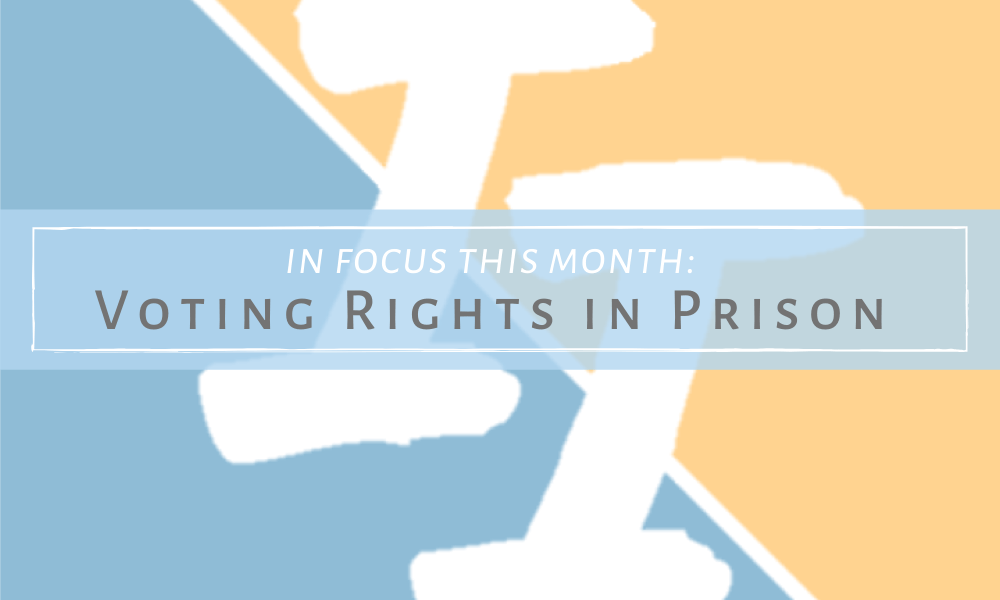When people are incarcerated, particularly for felony convictions, they near universally lose the right to vote. And even people incarcerated for misdemeanor offenses who retain the ability often have difficulty exercising their voting rights.
This disenfranchisement, in some states, follows folks even after being released from prison. As of 2016, an estimated 6.1 million people are disenfranchised due to a felony conviction, a figure that has escalated dramatically in recent decades as the population under criminal justice supervision has increased. There were an estimated 1.17 million people disenfranchised in 1976, 3.34 million in 1996, and 5.85 million in 2010.
“6 Million Lost Voters: State-Level Estimates of Felony Disenfranchisement, 2016” The Sentencing Project, 6 October 2016. https://www.sentencingproject.org/publications/6-million-lost-voters-state-level-estimates-felony-disenfranchisement-2016/
The history of voting suppression in the United States starts at the nation’s founding and continues on today. Those who have not been stripped of their voting rights have a responsibility to advocate inside and outside of the polling booth for others living in this country – whether they are living inside or outside a prison cell.
Support the national movement for a more just democracy.

The Advancement Project is a multi-racial civil rights organization that fights for voting rights restoration, voter protection, and the right to vote broadly at the local and national levels.
Learn more on the Advancement Project website.
Where do the 2020 presidential candidates stand?
Donald Trump has expressed both opposition and support for incarcerated enfranchisement.
Bernie Sanders endorses all incarcerated people retaining their right to vote.
Elizabeth Warren is open to eventually allowing incarcerated people to permanently retain the right to vote, but would begin by re-enfranchising upon release.
Joe Biden wants states to automatically restore voting rights for individuals once they have served their sentences.
Pete Buttigieg believes that all formerly incarcerated people should automatically regain their voting rights.
Tulsi Gabbard supports restoring voting rights for formerly incarcerated people.
Amy Klobuchar supports restoring voting rights for formerly incarcerated people.
Tom Steyer supports restoring voting rights for formerly incarcerated people, but not during incarceration.
Michael Bloomberg supports restoring voting rights for formerly incarcerated people.
“Should any individuals be able to vote while incarcerated?” The Washington Post, 14 January 2020, https://www.washingtonpost.com/graphics/politics/policy-2020/voting-changes/felon-disenfranchisement/
Good News
Several jurisdictions, including New Mexico, Hawaii, and the District of Columbia have recently introduced legislation to ban disenfranchisement. Currently, Maine and Vermont are the lone two states in which all who are incarcerated maintain the right to vote.
Bad News
Legislation to abolish disenfranchisement entirely has been unsuccessfully introduced in Nebraska, Massachusetts, Virginia, and Connecticut in the past year. Due to restrictions in 34 states, a majority of people with a felony record have not had their right to vote restored.
“Unlock the Vote: Voting Rights Flyer” Prison Fellowship, 12 March 2019. https://www.prisonfellowship.org/wp-content/uploads/2019/04/VotingRightsFlyer2019_Mar12_F.pdf?mwm_id=304492127696&sc=PGNWAAG190104012&sc=PGNWAAG190104012&gclid=Cj0KCQiAyp7yBRCwARIsABfQsnTSque8AwE6C-hB8TxhLmKVPtmCdQtFX7GEJ6wB5f6_IyQMUF3oNpkaAp4dEALw_wcB
Subscribe to receive the monthly newsletter and more information about Interrogating Incarceration!
Newsletter curated by:
Alia Nahra and Meg Galindo
